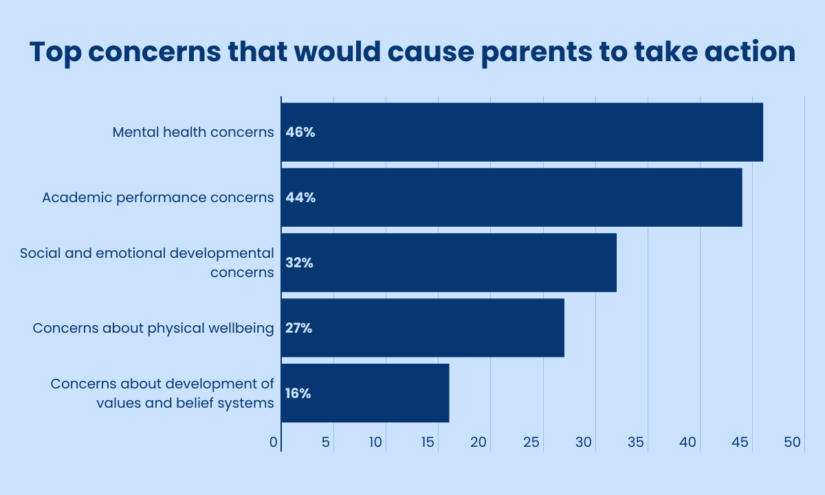During this summer, a team of students from MIT embarked on a journey to the sou …
Top Reasons Parents Consider Changing Schools: Children’s Mental Health Issues, Report Finds
Emma Wordsmith

Almost half of families considering new educational choices, particularly those with middle school students, cite their children’s mental health as the main reason for making a switch, according to a recent report. The report, released by consulting firm Tyton Partners, warns that districts that have already experienced significant enrollment declines may lose even more families if they do not address the mental health needs of students.
A survey of “open-minded parents” who are interested in school choice options found that 46% of them were driven by their children’s mental health concerns. For middle school parents, the percentage was 54%, followed by 48% for high school parents, and 44% for parents of elementary school children.
Adam Newman, a founding partner at Tyton, expressed his concern about the impact of mental health concerns on parents’ decisions. He believes that many parents feel that traditional schools do not adequately meet their children’s needs and that alternatives may provide a better environment for learning. Newman’s comments reflect the results of the survey, which shed light on the mental health crisis affecting young people since the pandemic closures. With federal relief funds and their associated mental health investments set to expire soon, many districts have used the funds to hire additional mental health professionals and establish special rooms for anxious students or those who act out in class.
Despite efforts to address mental health, the American School Counselor Association reports that the average ratio of students to counselors is the lowest it has been since the 1980s. There is still a shortage based on the recommended ratio of 250-to-1. Jill Cook, executive director of the association, expressed concern that some districts may not be able to retain the additional counseling staff they have hired. Research shows that students who have access to a school counselor often have improved attendance, achievement, and behavior.
To address the staff shortages, schools have turned to teletherapy programs, and the federal government is offering grants to increase the supply of mental health professionals. However, the report highlights specific cases where students in need of help were unable to access counseling services due to limited availability. In some instances, parents chose to transfer their children to different schools or homeschool them to ensure their emotional well-being.
Consultants who assist families in navigating school choice options understand why emotional health concerns are pushing parents to seek alternative schooling options. Colleen Dippel, CEO of Families Empowered, confirms that bullying and negative experiences at school are major factors that lead families to leave their current schools. In some cases, children express their dislike for school and display signs of emotional distress, prompting parents to seek a better educational environment for their children.
Tasha Tarpley, a single mother from Texas, made the decision to withdraw her son from his previous school after he faced repeated confrontations with other students. These incidents caused her son to fear going to school and had a significant impact on his emotional well-being. Tarpley chose a hybrid homeschooling program called Leading Little Arrows to provide her son with a healthier and more tailored educational experience.
Despite the challenges, there are instances where switching to a different public school within the same district can resolve concerns. Whitney Oakley, superintendent of the Guilford County Schools in North Carolina, encourages families to explore the various options within the district before completely changing schools. The district offers numerous school choices, and Oakley herself utilized this system for her own son, who struggles with anxiety.
In addition to focusing on mental health services, some districts have made efforts to prioritize academics. However, academic performance ranks second as a reason for parents to consider switching schools. In some cases, parents find out about their child’s academic challenges late, as in the case of Tasha Tarpley’s son who had missed out on basic math skills.
The report also addresses the concerns and hesitations that parents have regarding switching schools. Some parents worry that their children will miss out on important experiences or opportunities if they leave the public school system. The report concludes with a discussion of parents who choose to supplement their children’s existing education through extracurricular activities or pursue alternative models, such as private schools or microschools.
The survey results indicate that improving mental health and academic performance are key factors in parents’ decision-making processes when it comes to choosing a new school for their children. It remains to be seen whether parents who have changed schools are satisfied with their decisions, as this follow-up is part of the researchers’ future plans.
Overall, the report provides valuable insights into the evolving landscape of parents’ K-12 educational options. It addresses the importance of mental health in decision-making and highlights the need for districts to prioritize the well-being of students to ensure their success.
Source: The 74


